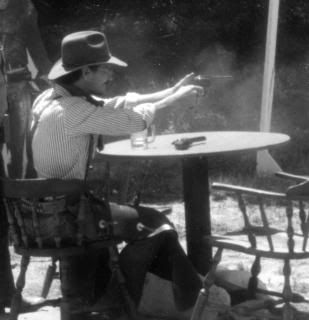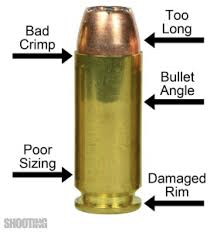Go  | New  | Find  | Notify  | Tools  | Reply  |  |
Quit staring at my wife's Butt |
I have been loading RMR brand JRN for my 9 mm at 1.160 and they have ran perfect in my new G45. I switched over to RMR JHP and loaded them at 1.110 as per recipe. I had several failure to go into battery today. Trying to eject them was not easy the gun just locked up pretty tight. checking them by dropping one in the barrel the RN were fine and not touching the rifling but the HP you could easily see where they were touching, and didn't go all the way in. to achieve the same result on both bullets I hat to load the hp at 1.090 which is off recipe by .020 is this going to be a problem ? the same bullets did run fine in my 365 you can feed it anything and it doesn't care. ( honey Badger) I do know the G45 has a marksman oem barrel that is suppose to be more accurate then the average 19 barrel. I don't want to load up a bunch and have some issues, my range is about 40 minutes away or I would just run up there and try a few out. Any thoughts?? | ||
|
| Avoiding slam fires  |
Jhp's are trickey depending on manufacture.They have to backed off the ball type bullets spec,a few K. Part of the front of the bullet you are trying to gauge is missing and forceing a fatter part of the head up too much. That is if I paid attention to your description | |||
|
Member |
As always in reloading; OAL is bullet & gun specific. Change bullets, change gun, the loaded round must fit. So you will need to shorten the JHP a bit until it fits. If you are NOT running max loads, nothing to change. If you are running max loads, dropping 1-2/10gr & working it back up is advisable. Use a chrono to see where you are & where you are going. All things being equal, an increase in vel shows an increase in pressures. IF YOU AREN'T HANDLOADING, YOU AREN'T SHOOTING ENOUGH! NRA Instruc: Basic Pistol & Met Reloading | |||
|
Quit staring at my wife's Butt |
o.k. thank you ! I set the bullet just enough to clear everything up and I'm not at max load. so I will give that a try. | |||
|
| Member |
Once you have the barrel, make up a long dummy round to make sure it chambers. Make sure you notate the OAL and the lands to base measurement. From there, back of a .01 or .02. IF you don't have the barrel, don't try loading any rounds for it. | |||
|
| Member |
First, look at the JHP next to a RN bullet. You'll see the ogive is longer on the RN to the meplat than a HP. Thus, the HP will hit the lede/rifling sooner that the RN and will need a shorter COL. COL Note: Per Ramshot (and all other reloading suppliers): “SPECIAL NOTE ON CARTRIDGE OVERALL LENGTH (COL) It is important to note that the SAAMI COL values are for the firearms and ammunition manufacturers industry and must be seen as a guideline only. The individual reloader is free to adjust this dimension to suit their particular firearm-component-weapon combination. This parameter is determined by various dimensions such as 1) magazine length (space), 2) freebore-lead dimensions of the barrel, 3) ogive or profile of the projectile and 4) position of cannelure or crimp groove. • Always begin loading at the minimum "Start Load". • Increase in 2% increments towards the Maximum Load. • Watch for signs of excessive pressure. • Never exceed the Maximum Load.” Your COL (OAL) is determined by your barrel and your gun and your magazine. What worked in a pressure barrel or in my gun has very little to do with what will work in your gun. Load a couple of dummy rounds (no powder and no primer) to the max. COL (OAL) and see if it fits your magazine, feeds in your gun, and chambers in your barrel. Seat the bullet slightly deeper until you achieve all three of these goals. This is the COL (OAL) for you in your gun with that make of bullet. For feeding and chambering issues: Plunk Testing: Take the barrel out of the gun. Drop rounds in until you find one that won't chamber. Take that round and "paint" the bullet and case black with Magic Marker or other marker. Drop round in barrel (or gage) and rotate it back-and-forth a few times. Remove and inspect the round: 1) Scratches in the ink on bullet--COL is too long 2) Scratches in the ink on edge of the case mouth--insufficient crimp 3) Scratches in the ink just below the case mouth--too much crimp, you're crushing the case 4) Scratches in the ink on case at base of bullet--bullet seated crooked due to insufficient case expansion (not case mouth flare) or improper seating stem fit 5) Scratches in the ink on case just above extractor groove--case bulge not removed during sizing. May need a bulge buster.  | |||
|
| Member |
9mm head spaces off the case mouth. You should only crimp enough to flatten out any bell on case mouth and to have the case fit the chamber. In revolvers you generally have to crimp into a crimp grove to prevent any set back of the bullets next in line to be fired. Very important in +p ammo or in Mag rounds. Even then don't crimp to much or you stand to raise chamber pressure | |||
|
| I have not yet begun to procrastinate |
In revolvers you generally have to crimp into a crimp grove to prevent any set back of the bullets next in line to be fired. The other direction -> hard recoiling revos have bullets next in line grow in length not set back. I knew what you meant but getting info to a potential new reloader needs to be proofread. -------- After the game, the King and the pawn go into the same box. | |||
|
| Member |
I have a pistol that LOVES my XTP 230g reloads, it HATES factory JHP b/c the factory JHP is too short. | |||
|
| Powered by Social Strata |
| Please Wait. Your request is being processed... |
|
© SIGforum 2025